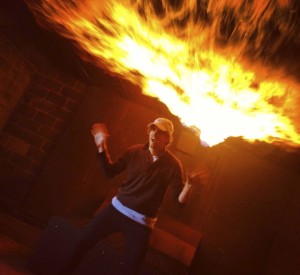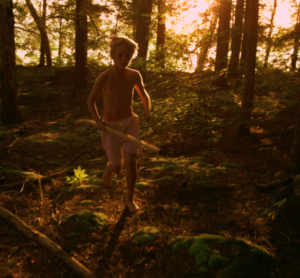Scenes from narrative short that debuts Saturday shot in area
By Kathleen Brady Shea, Managing Editor, The Times

Pocopson native Henry Roosevelt marvels at the flames created on the set of “Native Boy.” His producer, Brad Gulick, said, “As soon as we knew the story involved a firefighter, we knew we had to film firefighting in a way that had never been done before – raw, intimate, and dangerous. And we wanted to film with authentic period equipment, tools and tactics native to the 1970s. We had our work cut out for us.”
A penchant for forging lasting bonds that originated in Pocopson Township has led a 27-year-old filmmaker to premiere a short narrative film that he and his tight-knit production team hope will launch future projects.
“Native Boy,” spearheaded by Henry Roosevelt, will debut on Saturday at the Ambler Theatre. The event will begin at 4:30 p.m. with a reception catered by Whole Foods. The screening is scheduled for 5:20 p.m. It will be followed by a question-and-answer session with the cast and crew, most of whom have regional ties. To purchase tickets, visit http://nativeboyfilms.com/events/#.UVnjq6XJDzI.
The story, which pays homage to firefighters, portrays a retired firefighter turned children’s book author who crafts a captivating tale about a boy on a quest to capture the sun. It draws on the experiences of Roosevelt as well as those of his crew, several of whom are friends from the Lawrenceville School in New Jersey.

Clay Story plays the title character in “Native Boy,” a narrative short film by Pocopson native Henry Roosevelt that debuts on Saturday in Ambler.
Brad Gulick, a Lawrenceville alum who studied architecture at the University of Pennsylvania and served as producer, said the absence of egos facilitated the work. “’Native Boy’ is a true collective effort,” he said.
Roosevelt, who now lives in Manhattan, said he got his start in filmmaking at Unionville High, which he attended for a year before indulging his longing for a boarding school. “I remember editing away on some old school Avid machines … for various history presentations and class projects,” he said. “Any opportunity I had to film, I took.”
He continued that passion at the Lawrenceville School and then minored in film at George Washington University, where he received a degree in English and communications and racked up a number of rowing awards.
That avocation landed him a role in “The Social Network,” the film that chronicled the creation of Facebook. Roosevelt played one of the rowers in the scenes depicting the Henley Royal Regatta, an annual British event that served in the film to highlight the geographic reach of the social-networking site.
Roosevelt, who has served as a production assistant on shows including “30 Rock,” “Boardwalk Empire,” and “Law and Order,” also filmed a documentary in Africa about Liberian amputee soccer players called “We Stand Alone” that is due out later this year.
Dave Lichter, a fifth-grade teacher in the Unionville-Chadds Ford district who now works at Pocopson Elementary, remembers hearing Roosevelt talk reverently about Camp Tecumseh, the legendary New Hampshire program that features prominently in “Native Boy.” In fact, the film’s title character was attending the camp when Roosevelt visited right after investing his life-savings on a revolutionary new camera, said Gulick.
According to Gulick, Roosevelt wanted to experiment with his prized Red Epic, a state-of-the-art digital video camera, and asked a group of boys at the camp to serve as subjects. One of the shots he wanted involved walking into a muddy swamp and coming out screaming. At the end of the impromptu session, Roosevelt had the genesis of the film as well as its young star: Clay Story, the only kid who stuck around for the duration.
Fortunately, for Roosevelt and his team, Story was not the only one with loyal, staying power. Little by little, the group not only achieved its fund-raising goal of $9,500, but also exceeded it, eventually raising over $15,000 to bring “Native Boy” to the screen, Gulick said.
Roosevelt, who described Camp Tecumseh as a “rough and tumble” environment that fostered independence, said the experience initiated his desire to attend a boarding school, a preference reinforced by novels like A Separate Peace and the film “Dead Poets Society.”
Influences from across his background have factored into the film, with varying degrees of impact, he said. His parents, Harry and Janice, have had pivotal roles in the process, and his brother, Ben, is the sound mixer for “Native Boy.” The film’s production designer, Perry Mateson, “is a girl I met in Honors English at Unionville high School,” Roosevelt said.
Some of the film’s scenes were shot in East Marlborough Township, and others feature the Pocopson Home, where Roosevelt found “genuine acting talent in every corner.” He said the residents and staff at the home were supportive and enthusiastic, and he “can’t wait to show them a cut of the film.”
Gulick said the team worked efficiently with “ground-breaking, all-digital workflow” and without cutting corners. As a result, a cast and crew of about 15 produced what would typically require 200, an effort that promises “to rewrite the status-quo of independent filmmaking,” he said.
Roosevelt said Lichter served as a particularly positive role model. “It’s few and far between that you find a teacher that you really gravitate toward … At the time, at that age… it’s hard to pinpoint why you respect someone, why you want to impress them, why you want to simply do well by them – Mr. Lichter was one of those people,” he said.
He recalled that influence when he worked with his 10-year-old star, trying to strike a balance between warmth and authority. He said the shoots, which involved early morning wake-ups, burning buildings, and frog-filled swamps, were often grueling. On the last day of filming, “Clay was sick. And with one final scene to shoot, I couldn’t afford to have him miss it… I pushed him, a lot. I’m sure it’s more a reflection of Clay’s disposition, but he came through – amidst the pain.”
Roosevelt said the last thing he told him was “I don’t think you’ll understand what you’ve accomplished. You might not appreciate it until much later in life – but you did a hell of a job. One day, I hope, I think he will agree that the ends justified the means.”
Lichter said he had not seen Roosevelt in years and recently reconnected with him online after receiving an email from his mother. Reading Roosevelt’s comments about the film on various websites had a time-traveling aspect, Lichter said, explaining that he recognized Roosevelt’s distinctive voice. “It’s like he’s become a grown fifth-grader,” Lichter said, adding that he “wouldn’t miss” the film’s premiere.
Although Roosevelt has witnessed the celebrity milieu first-hand, he has no desire to pursue it. “This film, for me, on a personal level, reads as my disenchantment with that … and a personal effort to get back to that state of wide-eyed wonderment – where we are all boys, running around, chasing the sun,” he said.
Now his goal is to share that exuberance with as wide an audience as possible.
“Nobody knows about us yet,” said Gulick, adding that a distributor would be welcomed. “We hope to change that …Small steps, big aspirations.”
The Ambler Theatre is located at 108 E. Butler Ave., Ambler, Pa., 19002. For more information on the film, go to http://nativeboyfilms.com or https://www.facebook.com/NativeBoyFilms.






